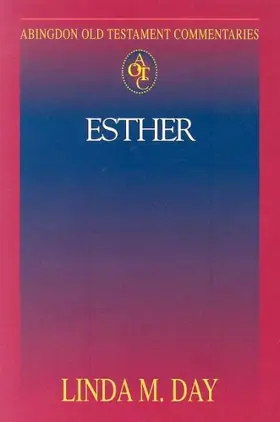

Esther
in Abingdon Old Testament Commentaries
Pages
177 pages
Publisher
Abingdon Press
Published
2005
ISBN-13
9780687497928
In this commentary, Day addresses both perennial and contemporary concerns pertinent to the book of Esther. Attention is given to literary, linguistic, and thematic features of the biblical text. Day considers the book of Esther with an eye to concerns of gender and ethnicity, as well as the theological concerns raised by divine absence in the story.
Reviews
Nashville: Abingdon, 2005. Pp. xi + 177. Paper. $24.00. ISBN 0687497922. Jean-Daniel Macchi Université de Genève Genève, Switzerland L’ouvrage sous recension s’inscrit dans le cadre d’une collection de commentaires bibliques compacts, destiné à un public, de théologiens, d’ecclésiastiques et de personnes cultivées, intéressé à l’interprétation de l’Ecriture. Rédigés par des spécialistes issus de diverses confessions, les Abingdon Old Testament Commentaries ne présupposent pas, chez leurs lecteurs, la connaissance de l’hébreu et du grec. Ils s’attachent cependant à développer une analyse littéraire et socio-historique de bon niveau ainsi qu’une réflexion théologique et éthique. Ce commentaire du livre d’Esther a été rédigé par une des meilleures spécialistes de ce livre. Linda Day a, en effet, publié en 1995 une passionnante étude comparative des trois textes d’Esther, le texte hébreu massorétique et les deux recensions grecques (LXX et Texte-Alpha). Rappelons que les traductions grecques comportent six importants suppléments absents de l’hébreu (rêve de Mardochée, le texte des décrets, prière d’Esther et de Mardochée etc.). Etonnament, et en dépit, tant des compétences de la rédactrice que de la visée oecuménique de la collection, seul le texte massorétique est commenté. Ce point peut surprendre dans la mesure où le texte grec de la LXX a longtemps constitué le seul «Ancien Testament» des Bibles chrétiennes et que, de nos jours encore, les six suppléments font partie du texte présent dans les Bibles catholiques.
[Full Review]
Good exposition of text written by a scholar skilled in literary approaches.
[Full Review]
Nashville: Abingdon, 2005. Pp. xi + 177. Paper. $24.00. ISBN 0687497922. Harald Wahl Philipps-Universität Marburg Marburg, Germany D-35037 Esther ist für Linda Day eine alte Vertraute. Zehn Jahre nachdem Day mit ihrer wegweisenden komparativen Dissertation „Three Faces of a Queen: Characterization in the Books of Esther“ (JSOTSup 186) in Princeton promovierte, liegt nun ihre für gebildete Laien, College-Studenten, Lehrerinnen und Pfarrer geschriebene Kommentierung der Megilla vor. Es ist ein Proprium dieser Reihe, der intendierten breiten Leserschaft an geeigneten Anknüpfungspunkten leicht begehbare Brücken für phänomenologisch verwandte gegenwärtige Themen—Rassendiskriminierung, Gender, Minderheiten, religiöse Toleranz, Schoa—zu bauen. Um es vorneweg zu sagen, diese Gradwanderung des existentiellen Transfers gelingt der umsichtigen Exegetin in einer für die eigene Lektüre und jeden Bibelgesprächskreis gewinnenden Weise. Doch kommen wir zum Gang der leicht verständlichen und klar gegliederten Monographie. Die um aktuelle Bezüge bemühte Einleitung behandelt nacheinander „Literary Aspects“ (3–12), den „Original Context“ (12–17) sowie die wesentlichlichen „Theological Concerns“ (17–22) der Megilla. Day behandelt in der komprimierten Einleitung alle wesentlichen Themen, die mit der Auslegung des hebräischen Buches verbunden sind.
[Full Review]
Nashville: Abingdon, 2005. Pp. xi + 177. Paper. $24.00. ISBN 0687497922. André LaCocque Chicago Theological Seminary Chicago, IL 60615 I greatly enjoyed reading Linda M. Day’ Esther commentary. The book teems with positive qualities, its reader-friendly style not being the least. Clearly, Day’s commentary is a work of love. It is to be ranked with the best of the recent studies on Esther, displaying in general a welcome scholarly acumen that Professor Day uses wisely. When the following review turns below to a number of critiques, these will not detract from the general assessment of excellence. Their raison d’être is to be perhaps considered later on at the time of a second edition of the commentary. The book follows the structural instructions given to the AOTC collaborators by general editor Patrick D. Miller (see the foreword [vii–ix]). The present work by Day displays also the main qualities of the series, offering a “compact, critical commentary for the use of theological students and pastors, and other researchers.” The introduction (1–22) is remarkable for its conciseness, vigor, and roundedness. Especially rewarding is its decisive contextual implantation. The author wants to read Esther with us, in today’s world, “after the Shoah” (21), and with an avowed sensitivity to the biblical book’s (and the reader’s world’s) issues of minorities, genders, and pluralism.
[Full Review]

